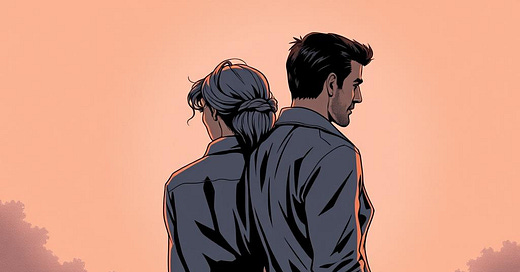No One Plans to Get Divorced. But 4 in 10 Couples Do. Why?
There are a handful of commonalities between the four in ten marriages that end in divorce. Since no one ever expects it will be them, it might be helpful to lookout for the signs.
No One Expects to Get Divorced
No couple gets married expecting to also one day get divorced.
Which is to say, no one plans to get divorced.
While some people may harbor small, quiet feelings of, “Meh, I suppose it’s possible this might end someday,” surely such an attitude is a tiny minority.
Which is odd if you think about it, seeing as how 4 in 10 marriages end in divorce.
(Note: the oft quoted “50% of marriages end in divorce” is outdated by about 40 years. Divorce rates have seen a gradual decline since the peak of 50% in the 80’s. Currently it sits at about 43%)
I’m willing to bet if you put 10 engaged couples in a room and ask them, “Do you think your relationship will end in divorce,” all of them will say no—even though they’re fully aware that 8 to 10 of the 20 people in the room will be wrong!
Given the odds of divorce, the steely certainty couples harbor about the implausibility of their own demise is irrational.
And yet…
I can tell you with full confidence that I would have been one of those in that room absolutely certain that my marriage would be one of the 6 in 10 that go the distance.
I never, ever thought we’d be 1 of the 4 that didn’t.
My internal drive to not repeat the history of my own parents, to not put my own children through the hell that is divorce, was quite possibly the single biggest motivator in my life. When people used to ask me what my life’s goal was, or what kind of legacy I wanted to leave, it was always, “I want to build a new family tree with me, my wife, and our children as the whole and healthy foundation.”
This singular focused vision for my life sent me to therapy back in 2013 for the first time, a herculean feat to show up, but a cost I was more than wiling to pay.
My passion for a marriage that went the distance then kept me going for the next ten years, constantly working on myself and working on our relationship.
So then, when people asked me early on, “Were you surprised by the divorce,” this was my response 👇🏼
But wouldn’t you know… as fate would have it, I have now become one of those sadly misguided eight-in-twenty people who incorrectly predicted the unbreakability of their marriage.
How does this happen?
And why?
I’ll talk in general terms below, and then next week with more specifics as it relates to my own situation.
Why Divorce Happens
So what goes wrong for those couples who declared “till death do us part,” and who unequivocally believed it, but then parted pre-death?
For starters, I begin with the belief that neither person in a divorce is ultimately the bad guy (or bad gal), which means that neither person is the sole victim.
Now, OF COURSE there are exceptions to this. Some people are so uniquely and individually awful, broken, or malevolent that it’s reasonable and true to say they are the problem.
But such exceptions prove the rule.
Do an audit on most divorces and you’ll discover that both sides have their reasonable list of grievances. Both people will have justifiable things to point to and say, “I tried… I really tried.” I’m not suggesting it’s always 50/50, but I am insisting it is rarely 100/0 (hell, even 90/10 or 80/20 probably doesn’t happen all that often).
For the most part both people have valid feelings for why they felt wronged and for why they believed the other person wasn’t upholding their end of the marital vows.
This isn’t the same thing as saying that all divorces are mutually agreed upon. Not at all. I imagine most divorces are disproportionately chosen by one party more than the other (as was the case with my own).
The point I’m making is that just because one person may want or choose the divorce, this does not mean that both people don’t share the responsibility for why the marriage ends.
As I think more about the “no one is the sole problem or sole victim” thesis, it’s also worth pointing out that in many (most?) cases both parties eventually, with enough time, can start imagining how life on the other side of their divorce will actually lead to something better. So even in more lopsided situations of “who is more to blame,” it tends to work out that divorce opens up a pathway toward a life that’s happier and more rewarding on the other side for both people.
In short, I’d bet that most divorces happen for good (enough) reasons, and most people tend to be better off no longer being in that particular marriage.
(Of course, what this does for the kids involved is a whole other question. While most adults may end up being better off on the other side of divorce, we have enough data to support that most kids are not better off on the other side of divorce. Divorce is one of the leading causes of trauma in young children and a very significant ACE (Adverse Childhood Experience). But we’ll save that topic for another day.)
The Divorce Blame Pie is Always Shared
Again, holding space for the exceptions, I think that if a person paints a picture where they alone were the one suffering in the marriage and they alone deserve people’s pity (because their ex “was the problem”), then that just tells me that person has yet to discover the liberation of taking responsibility for and owning their own stuff.
I’ve known people who’ve tried to paint such a picture to me of their situation, where their ex gets described as being the reason why the marriage failed, and rarely do I assess it as a reliable account. I’m not saying they’re lying, but I am saying that they probably would benefit from more self reflection and honest assessment.
The other day I wrote about my experience growing up as a child of divorce where my entire childhood was defined by one singular narrative about why my parents divorced. This lopsided story shaped an enormous amount of my personality, my worldview, and how I entered marriage and parenting as a 21 year old kid.
So I am well familiarized with both the desire to and the implementation of characterizing divorce in black and white terms where one person is the victim and the other the victimizer.
However, according to the data that we have on this stuff, most divorces are a result of some combination of:
both side’s failures, flaws, unhealed trauma, and unprocessed pain,
patterns of dysfunction that they both contributed to creating early on,
communication struggles (which is always a two way street),
both people growing into different versions of themselves that may no longer be compatible with the other,
diverging dreams, wants, and priorities (not right/wrong, just different)
All of the above requires two people. To say it again, the responsibility for why a marriage ended is (nearly) always shared.
The Blame Pie™ (if indeed we must use such a word as “blame,” and if we must visualize it as a tasty pastry) can always be divided up. Both people have their strengths and weakness, pros and cons. Both have ways they were helpful to the relationship and ways they contributed to its demise.
This description of why marriages end, and how neither side is solely the problem, maps on well to my own story. But I struggled to see or accept this early on because my grief was utterly blinding. In fact, when my brother first suggested that there “is no bad guy here,” no victim or person to blame, I didn’t and/or couldn’t believe him.
But time has brought healing, and healing has brought clarity. While hindsight may not guarantee 20/20, if you combine hindsight with healing then you will almost certainly see things far better than you once did.
I’m approaching three years post moving out and I am confident in saying that neither she nor I was solely responsible for our divorce. We both have good and valid reasons for why the marriage didn’t (or perhaps “stopped” is a better word) work well. And, as mentioned above, though it’s taken me a while to get here I’m also prepared to accept that we are both more likely to have a more rewarding and happy life no longer being married to one another—a sentence I could not have imagined uttering three years ago. (As for the kids, again, I’m not sure I can say the same thing for them just yet… the ACE and the trauma is real. Time will tell).
As for the specifics of what caused my own divorce?
I’ll have more to say about that next week.
For now I’ll end with this:
If you’re divorced, and you also didn’t see it coming, then I’m sorry. It sucks.
And if you’re divorced and now you’re living a happier, healthier, more whole life as a result, then wow how amazing is that! God truly does make beautiful things out of dust.
And if you’re married and want to do your best to avoid heading toward divorce, then I humbly submit that assuming it could never happen to you might not work in your favor.
Instead, accept that nothing is guaranteed.
And work your friggin’ butt off to stay connected, stay open, and do your best.







I love this because it brings up a notion I've had that we don't have soul mates. We can fall in and out of love. I do think that often marriages, or even non-marital relationships, fall apart because the fireworks have gone. The intensity stops so people think they are no longer in love. Love has a very broad spectrum. It is then my belief that this is why we can be "in love" with multuole people. Human touch and affection feeds our bodies and minds generating seratonin and dopamine and Human Growth Hormones. While in a relationship we can still find someone else, even when not looking for it, to spark feelings. Like anything in life it's up to us to act on the feelings or not.
I was married for 27 years. I never should have been knowing I was gay. I did fall in love with her and I didn't not enjoy sex with her, but it's not what I wanted. I began a hidden promiscuity with men. Maybe because I spent a lifetime of suppressing my true self I found many ways to hook up that fed my body and mind... all the while feeding my guilt for cheating on her. She didn't deserve it. I digress. Anyway... those are my thoughts on it.